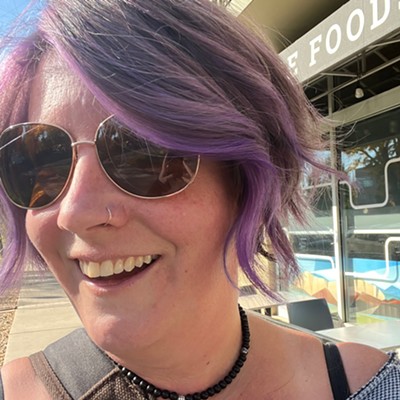See also: Homeless: Committee Okays $2.3M Solutions Center Plan Over Some Neighbors' Objections
There was no public comment at the council meeting, where the proposed purchase passed without opposition. Councilman Chris Nevitt, who represents the neighborhood where the building is located, said some residents requested public comment, but since they had already testified at other meetings that request was denied.
Neighbor Debi Drewes, who has lived in the neighborhood since 1979, says her concern with the Solutions Center isn't about having such programming in the neighborhood, but the lack of details about the program. The city has said the center will be a 46-bed facility; all clients will be referred (there's no walk-in option) and the city has promised that security will be required. Further details will not be available until the RFP is released and a service provider is chosen to run the center.
"The city is listening because we jumped in their face and said, 'hey, slow down!" Drewes says. "I want to see these people get help, and there are a lot of good intentions...but the city is taking something and running with it. I don't think they have really thought about it."
Originally, the city wanted the building to house a 24-hour homeless rest and resource center -- a project that would have provided homeless services and allow drop-in visits. The neighborhood fought that proposal, and the city quickly changed it to the behavioral health concept, dubbed the "Solutions Center." The program is modeled on one in Seattle, managed by the Downtown Emergency Service Center.
The program in Seattle includes 46 beds; as with the proposed Denver program, they include sixteen temporary emergency crisis beds and thirty beds that offer a short respite from the street. (Denver's program is proposing individuals can stay thirty days; Seattle's allows a fourteen-day stay.)Bill Hobson, DESC's executive director, says all clients are referred by emergency services, as Denver's will be, and no one is allowed to just walk out the door -- individuals are escorted to shelters if they decide to leave or their time is up. Only about about 5 percent of individuals brought to the center leave against medical advice, he adds.
According to Hobson, finding permanent housing after a client's fourteen-day stay is a challenge; that is also likely to be a problem in Denver, which already suffers from a shortage in affordable housing. He says DESC finds permanent housing for about 10 percent of the individuals who pass through the crisis center; most people go to the shelters. Despite the lack of housing, he says the number of repeat visitors is low, at about 10 and 15 percent. "And that's okay with us," he adds. "If they go back into crisis, they are in crisis and we want to help them get out of it."
In the beginning, Hobson says, neighbors fought the Seattle program, even suing and delaying it for six months. But since the project opened in August 2012, there have been no issues. In fact, there have been so few problems that the neighborhood committee created to oversee any issues disbanded earlier this year. "This center is a nonevent in our neighborhood," he says.
In Athmar Park, where the Platte River Drive building is located, neighbors have expressed concerns about the center hurting the neighborhood's revitalization, specifically the Greenway Foundation's $5.5 million renovation of Habitat Park, which will have educational activities for children. The Greenway Foundation has not taken a position on the Solution Center purchase.
The building is zoned to be used as a homeless shelter and medical clinic -- the combination of uses will allow the number of proposed beds. Michael O'Flaherty, the city's building administrator in the zoning office, says many buildings in that industrial area have multiple uses; he adds that he can't comment on the specifics of this building until an application is made.
The city has repeatedly said it would not expand the center to add beds, but neighbors are concerned that the size of the building will allow for an expanded program. The Seattle building is large for 46 people, says Hobson, though he wasn't sure about the square footage. The extra space was taken up by kitchens, game rooms and seating areas for the clients, he notes.
Homeless advocates are concerned about the money being spent on this additional service, when shelter beds and affordable housing are needed. These two issues have been named priorities in the city's ten-year plan, and some see the Solutions Center as a divergence. But the mayor's office says affordable housing in particular is still a priority, as outlined in Hancock's five-year housing plan, as is the 24-hour rest and resource center, which was promised when the city passed an ordinance banning sleeping outside.
In a recent report by the U.S. Conference of Mayors, Denver reported it was able to accommodate all individuals in its shelters. The 11 percent of the homeless population it reported turning away were families with children.
The RFP for the Solutions Center is being drafted, and more details about the programming will be released when that draft is done. The Solution Center is slated to open in the second half of 2015 at the earliest; before it does, the Athmar Park Neighborhood Association is expected to write a Good Neighbor Agreement for the service provider that steps into the building, and develop a committee to oversee the program's development. Have a tip? E-mail [email protected].











